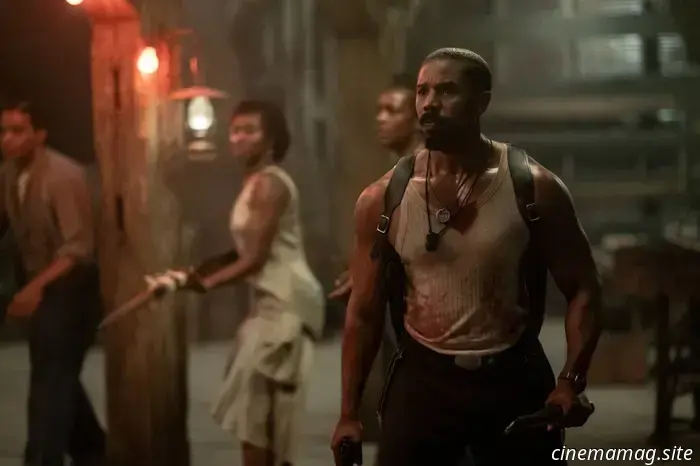
Sinners Review: Ryan Coogler Infuses Vitality Into a Lusciously Narrated, Sensual Vampire Story
From increasingly heavy-handed "Eat the Rich" satires to a relentless wave of horror infused with social commentary following "Get Out," it appears there is no end to what the New Yorker recently labeled cinema's "plague of literalism." Particularly for genre films, each satirical target is presented with such intensity, akin to the gallons of blood splattered on screen, that it becomes impossible to misinterpret or overlook them, which ironically makes them less engaging to analyze, despite filmmakers pushing their ambitious allegories to the forefront. This may lead to immediate acclaim, as seen with "The Substance," but no director's concept can linger in the public's mind when it's presented so plainly, leaving no additional food for thought beyond the obvious.
I was concerned that "Sinners," director Ryan Coogler's return to original storytelling after two successful franchise movies—and a less well-received sequel—would follow a similar trend. In this literal age, securing a major studio's funding for a costly, non-IP project is unlikely unless its ideas are expected to resonate broadly. Yet, despite its splatter-friendly premise reminiscent of "From Dusk Till Dawn," Coogler has managed to treat his audience with respect, avoiding blatant parallels between his historical narrative and present-day issues. Instead, he allows his film to function as an engaging thrill ride on the surface, while offering a much deeper narrative without a single allegorical interpretation upon closer inspection. It resembles less the straightforwardness of "Get Out" and more the complexity of the films Jordan Peele has made after achieving filmmaker status; I wouldn’t be surprised if initial critical responses mirror those given to "Us," attempting to force a singular metaphor onto a far more intricate work.
Coogler and Peele are distinct filmmakers, and the comparison isn't simply due to their status as two of the few Black directors currently granted the opportunity to lead projects of this magnitude. It comes from my belief that "Sinners" could suffer from the same misinterpretation that "Get Out" faced from liberal critics, who initially perceived it as a critique of Trump-era America, while it delves into social structures that have existed long before either of his terms in office. This tendency to invoke his name will likely arise within the first five minutes when twin brothers Smoke and Stack (Michael B. Jordan) tour an abandoned warehouse they intend to renovate into a juke joint; set in 1932, they have just returned to their Mississippi hometown during the Jim Crow era, but the white landlord assures them that the KKK and other forms of racial hatred are relics of the past. If you're aware that "Sinners" is a supernatural thriller from the outset, you might cynically assume this serves as a clear horror metaphor for the racism that persists nearly a century later. It does not.
Coogler avoids any simplistic comparisons between this post-Depression period and our own, dedicating the initial half of the story to a character-driven drama about two brothers who return home after several years, utilizing the money they earned in Chicago—amid rumors of their association with Al Capone—to re-establish relationships they had put on hold. Much like "From Dusk Till Dawn," which the writer-director cites as a significant influence, the first half is almost entirely devoid of horror, richly developing the brothers and their acquaintances as they scramble to throw an opening party at their juke just hours after acquiring it. It's uncommon to encounter a major studio film where the director has the latitude to fully immerse his period setting, allowing the film to breathe and enabling musician characters (played by the remarkable newcomer Miles Catton as the twins' cousin, and the consistently excellent Delroy Lindo) to perform, halting the passage of time all around them.
In the case of Catton’s Sammie Moore, a young blues prodigy, this skill is made literal. Few directors have utilized the IMAX camera as effectively as Coogler does in a single take, where centuries of Black music (spanning blues and jazz to contemporary hip hop) converge through the power of the performance, the only moment the film references anything beyond its historical context. It serves as a simple tribute to the impact of music, which might seem underwhelming when described but is captivating in execution. In terms of allegory, music becomes the driving force—particularly when a vampire army led by Jack O’Connell’s sinister folk singer Rennick lurks outside, eager to be let in. Coogler does not aim to subvert vampire mythology; it follows the same rules as any other tale within the genre, but what the creatures symbolize is far less straightforward.
Two of Rennick’s initial victims are KKK members, though I interpret this as a deliberate misdirection, leading viewers to believe that racism is the clear motivator behind his actions, while he represents a more systemic evil: the exploitation of Black artists and the appropriation of their culture by white audiences who consume their works

Other articles
Sinners Review: Ryan Coogler Infuses Vitality Into a Lusciously Narrated, Sensual Vampire Story
From ever more oppressive "Eat the Rich" satires to an unceasing wave of horror films infused with social commentary following "Get Out," it appears there's no end to what the New Yorker recently referred to as cinema's "plague of literalism." In particular, genre films seem to pile on their satirical targets as heavily as the torrents of blood shed on screen––unavoidable.
